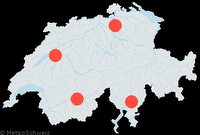This was the pollen count for Switzerland twenty minutes ago. The colour indicates something between medium and high:

It's not my only allergic condition. My nose is rather sensitive to chlorine. When swimming, I have to be careful that no water gets into my nose. This happens most likely during backstroke or a tumble turn. About four to six hours after the exposure, my nostrils close down for two days.
A couple of years ago, I was afraid that I've got another allergic reaction to chlorine. After swimming, I discovered red spots on my upper chest. They were either on the left or right or symmetrically on both sides. It took me weeks to figure out, that these were self-inflicted grazes. When I was swimming with a five o'clock shadow and not concentrating on a proper crawl style, I scratched my jaw next to my shoulder, which caused this weird spots.
Back to the hay. When I was a small boy, chickenpox started when I was lying on a cart load of hay on the way back to the farm. It took several years until I tried this comfortable ride again, because I thought, chickenpox is caused by hay.

1 comment:
Treating allergic rhinitis is a tricky task. The mechanism of allergic rhinitis is immunological. There are no definite treatment available. However you may treat the symptoms of your hay fever. You may use topical applications such as decongestants and antihistamines. Another way is to make you less sensitive to pollens or other allergens is to give a series of special shots. The injections should be done by a doctor that treats allergies. Russian doctors had some additional medications. For example, one of my relatives was very happy about using a special mixture of thymic hormones. The mixture was produced by a Russian pharmaceutical company. That type of treatment targets namely the mechanism of the disease. However the treatment is not FDA approved.
Considering the lack of targeted treatments, the best way for you would be to prevent the hay fever in the first place.
To avoid exposure to pollens and dust:
*It is good practice to stay inside whenever you can during the pollen rich seasons.
*Avoid contact with cut grass and leaves.
*Do not dry your clothes outside. They may collect the pollens.
*Close doors and windows in the time of increased pollen production. RDoctor.com. http://www.nih.gov
Post a Comment